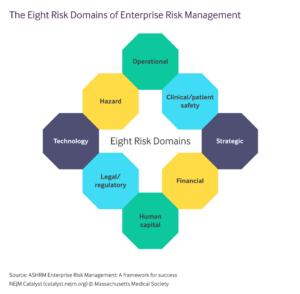As we move into the next phase of the COVID-19 pandemic, the health care industry finds itself with an advantage it hasn’t had in more than two years: time to prepare for what comes next.
There is now more opportunity to evaluate and prepare (instead of merely reacting) for new variants and other potential emergencies, including evaluating the emergency protocols, training, and education hospitals and health systems put in place during the crisis. Additionally, we have the occasion to review areas for improvement and refinement (i.e., what we can add and what no longer applies).
This evaluation and subsequent solutions are all part of health care risk management.
What Is Health Care Risk Management?
According to the New England Journal of Medicine (NEJM), health care risk management comprises the “systems and processes employed to uncover, mitigate, and prevent risks in healthcare institutions.”
With the expanding role of health care technologies, cybersecurity concerns, and regulatory changes resulting from the COVID-19 pandemic, health care risk management has become much more complex.
In response to the increasing complexity, hospitals and health systems are expanding their risk management programs from those that are primarily reactive, promoting patient safety and preventing legal exposure, to increasingly proactive models which view risk through the much broader lens of the entire health care ecosystem, NEJM says.
Becoming Proactive About Risk
Proactivity is an essential part of effective risk management. That means taking active steps to protect patient safety, reduce medical errors, and safeguard the health care organization’s employees, reputation, and assets.
This enterprise risk management approach covers eight domains:

It also involves the use of four measures as part of a comprehensive health care risk management plan.
Identify New Potential Risks
By its very nature, risk management involves managing uncertainty. If a global pandemic is any indicator, uncertainty is inevitable. Therefore, hospital leadership must make anticipating future threats a top priority.
To mitigate against the staff shortage risks posed by new COVID-19 variants, risk managers should conduct, document, and update hazard assessments, trace disease transmission, and assess employees’ mental and physical health.
Once identified, quantifying and prioritizing risks based on the likelihood of their reoccurrence is a necessary next step. That includes asking questions such as: Who is at risk? What is involved? What are the possible consequences? What solutions can we apply to prevent occurrence or reoccurrence?
Identifying and analyzing risks can also involve a variety of approaches, including interviewing patients, requesting staff feedback, reviewing medical records, and evaluating patient complaints and executive reports.
Implement Transparent Safety Protocols
Hospitals and health systems should implement clear and transparent safety protocols, which they evaluate and monitor routinely to ensure adherence.
That includes providing proper health screenings for all workers, evaluating personal protection equipment stores, readiness, and protocols for usage, and conducting disease prevention programs.
Make Safety Training Central to Clinician Training Programs
Clinical training programs should include written and accessible pandemic program training and education.
Hospitals need to ensure clinician training is robust across the entire facility and include new employee orientation, in-service and event-specific training, and an annual review and competency evaluation. Outsource such activity, if necessary, to ensure your facility benefits from the proper expertise.
Have a Dedicated Safety Resource
There should be one source of truth, regularly updated with the most recent information, for all risk management-related policies, documentation, and reporting.
A strategic risk management plan can serve as the guiding document for identifying, managing, and mitigating risk. Hospital leaders and department heads should be familiar with the document’s contents and involved in its development.
OSHA’s Role
The United States Department of Labor understands the need to prepare for what comes next, particularly related to the pandemic. In March 2022, the Department’s Occupational Safety and Health Administration (OSHA) announced a memorandum stating it would expend 15 percent of its enforcement activity to audit hospitals and skilled nursing facilities that treat COVID-19 patients.
OSHA inspectors will investigate facilities to ensure any prior COVID-19 complaints have been corrected and abated and determine whether facilities have adequate mitigation protocols.
OSHA is expanding its presence for two reasons: to assure ongoing mitigation to reduce COVID-19’s spread, along with future forms of the SARS-CoV-2 virus, and to protect the health and safety of health care workers who are in danger of contracting the virus.
Rely on Dedicated Risk Management Expertise
Health care risk management is essential for patient, clinician, and staff safety. It can mean the difference between life and death, especially where COVID-19 is concerned. With such high stakes, don’t be afraid to ask for help or partner with experts.
SCP Health is dedicated to patient safety and quality. The experts in our risk management department can assist you with all the advice and resources you need to manage risks and confidently move forward into the next phase of the pandemic and beyond.

